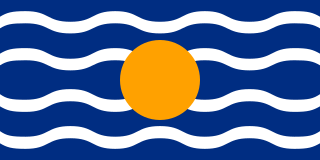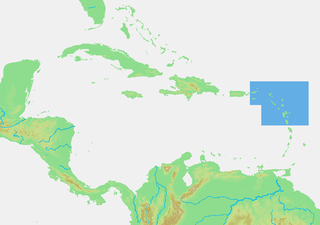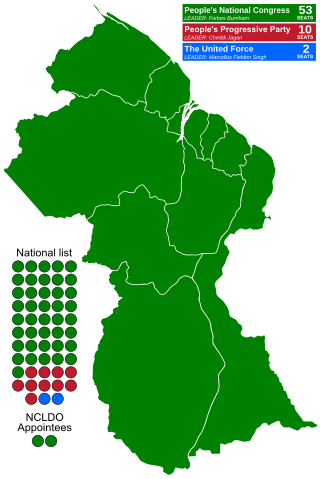
Antigua and Barbuda is a sovereign island country in the Caribbean. It lies at the conjuncture of the Caribbean Sea and the Atlantic Ocean in the Leeward Islands part of the Lesser Antilles.

The West Indies Federation, also known as the West Indies, the Federation of the West Indies or the West Indian Federation, was a short-lived political union that existed from 3 January 1958 to 31 May 1962. Various islands in the Caribbean that were part of the British Empire, including Trinidad and Tobago, Barbados, Jamaica, and those on the Leeward and Windward Islands, came together to form the Federation, with its capital in Port of Spain, Trinidad and Tobago. The expressed intention of the Federation was to create a political unit that would become independent from Britain as a single state — possibly similar to Canada, the Federation of Australia, or the Federation of Rhodesia and Nyasaland. Before that could happen, the Federation collapsed due to internal political conflicts over how it would be governed or function viably. The formation of a West Indian Federation was encouraged by the United Kingdom, but also requested by pan-Caribbean nationalists.

The Leeward Islands are a group of islands situated where the northeastern Caribbean Sea meets the western Atlantic Ocean. Starting with the Virgin Islands east of Puerto Rico, they extend southeast to Guadeloupe and its dependencies. In English, the term Leeward Islands refers to the northern islands of the Lesser Antilles chain. The more southerly part of this chain, starting with Dominica, is called the Windward Islands. Dominica was originally considered a part of the Leeward Islands, but was transferred from the British Leeward Islands to the British Windward Islands in 1940.

The British West Indies (BWI) were the territories in the West Indies under British rule, including Anguilla, the Cayman Islands, the Turks and Caicos Islands, Montserrat, the British Virgin Islands, Bermuda, Antigua and Barbuda, the Bahamas, Barbados, Dominica, Grenada, Jamaica, Saint Kitts and Nevis, Saint Lucia, Saint Vincent and the Grenadines, British Honduras, British Guiana and Trinidad and Tobago.

The United Progressive Party is a political party in Antigua and Barbuda. It was previously led by Baldwin Spencer, it was the governing party from 2004 to 2014. It has been in opposition since the 2014 election. Jamale Pringle was elected leader of the party on 21 April 2024, after the resignation of Harold Lovell on 20 January 2023.

Antigua and Barbuda is an island nation made up of: Antigua island, which is divided into six parishes; and of the two dependencies of Barbuda island and Redonda island.

Elections in Antigua and Barbuda take place in the framework of a parliamentary democracy.

The Barbuda People's Movement is a left-wing Barbudan nationalist political party in Antigua and Barbuda active only on the island of Barbuda. The party's symbol is the European fallow deer, national animal of Barbuda. The party seeks the secession of Barbuda from Antigua and Barbuda. The party is allied with the United Progressive Party.

The Parliament of Antigua and Barbuda consists of the King of Antigua and Barbuda, the Senate and the House of Representatives.

The monarchy of Antigua and Barbuda is a system of government in which a hereditary monarch is the sovereign and head of state of Antigua and Barbuda. The current Antiguan and Barbudan monarch and head of state, since 8 September 2022, is King Charles III. As sovereign, he is the personal embodiment of the Crown of Antigua and Barbuda. Although the person of the sovereign is equally shared with 14 other independent countries within the Commonwealth of Nations, each country's monarchy is separate and legally distinct. As a result, the current monarch is officially titled King of Antigua and Barbuda and, in this capacity, he and other members of the Royal Family undertake public and private functions domestically and abroad as representatives of Antigua and Barbuda. However, the King is the only member of the Royal Family with any constitutional role.

The Silver Palm Schoolhouse is an historic school in the Silver Palm Historic District within the unincorporated community of Redland, Florida, United States. It is located at Silver Palm Drive and Newton Road. On July 2, 1987, it was added to the U.S. National Register of Historic Places.

General elections were held in Antigua and Barbuda on 17 April 1984, the first after the country had become an independent Commonwealth realm in 1981.

General elections were held in Antigua and Barbuda on 20 December 1951. The election was the first in Antigua and Barbuda to be held under universal suffrage. Vere Bird formed the Antigua Labour Party in 1951 and led the party to victory, winning all eight elected seats on the legislative council. Voter turnout was 70%.

General elections were held in Antigua and Barbuda on 1 November 1956. The Antigua Labour Party retained all eight elected seats and the party's leader Vere Bird became Minister of Trade and Production after a ministerial system of government was established. Voter turnout was 57%.

General elections were held in Guyana on 15 December 1980. The result was a victory for the People's National Congress, which won 41 of the 53 directly-elected seats. However, the PNC's victory was the result of fraud as the government had direct control of the elections. Voter turnout was 82.3%.

General elections were held in Saint Kitts-Nevis-Anguilla on 6 October 1952, the country's first elections held under universal suffrage. The Workers' League won seven of the eight elected seats.
The Honourable Attorney General of Montserrat, usually known simply as the Attorney General, is the chief legal adviser to The Crown and the Government of Montserrat. In addition to providing legal advice to government departments and various statutory boards, the Office of the Attorney General is responsible for the drafting of all of the government's legislation, and also handles all civil litigation matters for the government.

Administrative structures for local governments can be found in Antigua and Barbuda. Antigua and Barbuda had seventeen district councils corresponding with the constituencies. Under the direction of the Local Government Officer, the district councils have been categorized into a total of four distinct zones. At a more fundamental level, village councils are encouraged the participation of local citizens. The island of Barbuda has a constitutionally-protected unique status, and it has given the authority to solicit financial contributions in order to meet the needs of its inhabitants.

This article covers the history of Antigua and Barbuda from 1958 to 1962, when it was a territory of the West Indies Federation.

This article covers the history of Antigua and Barbuda from 1962 until 1967. This period began after the fall of the West Indies Federation, and concluded with the establishment of the Associated State of Antigua.

















